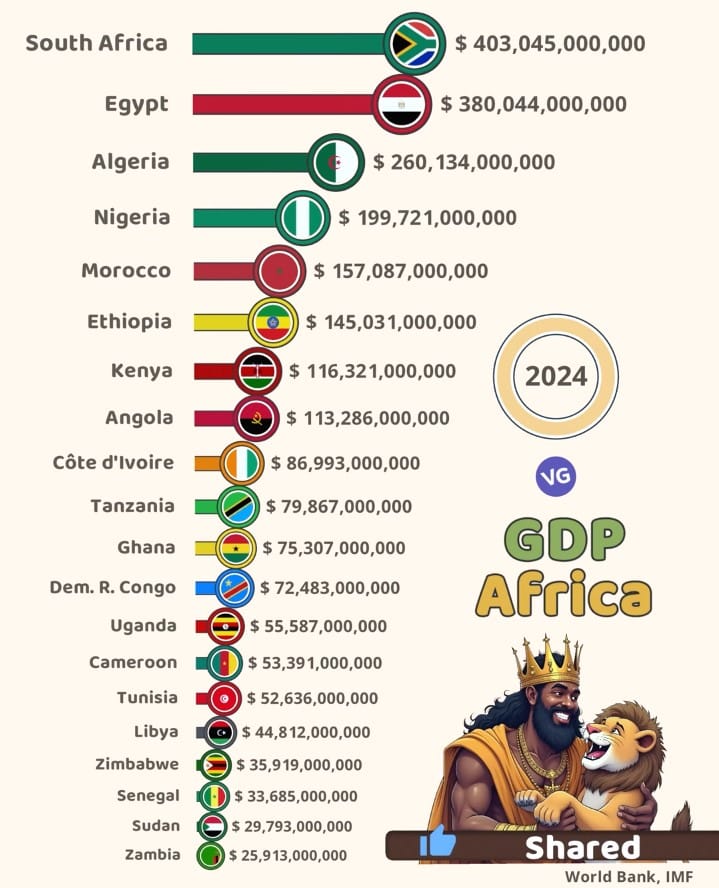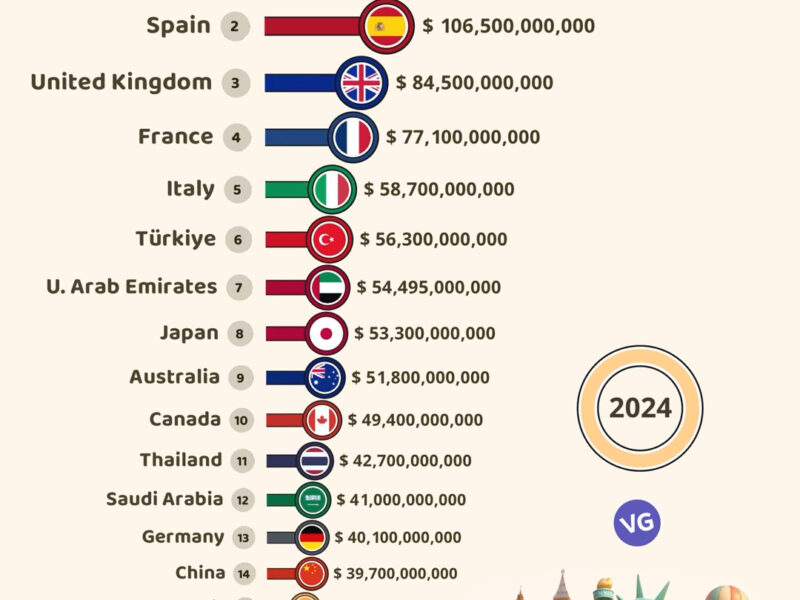South Africa is once again the biggest economy in Africa, according to the International Monetary Fund (IMF). It’s expected to have a GDP of $373 billion in 2024. This change shows the economic challenges and policies in different African countries.
The Largest Economies in Africa 2024
| Rank | Country | GDP (Billions USD) |
|---|---|---|
| 1 | South Africa | $403.0 |
| 2 | Egypt | $380.0 |
| 3 | Algeria | $260.1 |
| 4 | Nigeria | $199.7 |
| 5 | Morocco | $157.1 |
| 6 | Ethiopia | $145.0 |
| 7 | Kenya | $116.3 |
| 8 | Angola | $113.3 |
| 9 | Côte d’Ivoire | $87.0 |
| 10 | Tanzania | $79.9 |
| 11 | Ghana | $75.3 |
| 12 | Dem. R. Congo | $72.5 |
| 13 | Uganda | $55.6 |
| 14 | Cameroon | $53.4 |
| 15 | Tunisia | $52.6 |
| 16 | Libya | $44.8 |
| 17 | Zimbabwe | $35.9 |
| 18 | Senegal | $33.7 |
| 19 | Sudan | $29.8 |
| 20 | Zambia | $25.9 |
Despite global economic worries, Africa is set to grow fast. It’s expected to be the second-fastest growing region in 2024. The growth rate will be 3.5%, increasing to 4% in 2025.
But, many African countries face big economic problems. These include high debts, poor infrastructure, record inflation, and slow growth. The IMF’s report shows nine African countries are among the fastest-growing globally in 2024. This shows Africa’s potential and its varied economy.
As Africa’s economy changes, it’s important to look at its key players and what drives them. This article will explore the biggest economies in Africa. We’ll look at their growth, industries, and the challenges they face in the global market.
Overview of Africa’s Economic Landscape 2024
The African economic outlook for 2024 is mixed. The continent is set to see 3.5% average GDP growth, up from 3.3% in 2023. But, this number hides big differences in growth across regions and the effects of global economic issues.
Current Economic Growth Trends
Sub-Saharan Africa is expected to grow the most in 2024, with a 3.8% expansion. This is higher than the global average of 3.2%. The region is set to be the second-fastest-growing, after Emerging and Developing Asia. But, growth rates vary a lot across countries and sectors in Africa.
Regional Economic Performance
West Africa, led by Nigeria and Ghana, is set for a strong 4.5% growth in 2024. East Africa will grow at 3.9%, while Southern Africa’s growth is forecast at 3.2%. South Africa’s challenges weigh down Southern Africa’s growth.
Impact of Global Economic Challenges
African economies face global economic challenges despite positive growth. High inflation, rising borrowing costs, climate shocks, and political instability make the economic environment tough. Currency depreciations, reduced export earnings, and inflation have changed Africa’s largest economies. This shows the need for strong and flexible policies.
“The African economic landscape in 2024 will be defined by a mix of growth opportunities and global challenges. Navigating this complex terrain will require innovative approaches and a commitment to building resilient, inclusive, and sustainable economies across the continent.”
South Africa’s Rise to Economic Leadership
South Africa is now the biggest economy in Africa, with a GDP of $373 billion in 2024. Its diverse economy, led by the industrial sector, has been key to its success. The country excels in manufacturing, mining, agriculture, and tourism, driving its growth.
Industrial Sector Analysis
South Africa’s economy is diverse, with mining, manufacturing, and more playing big roles. The mining sector, in particular, has been crucial, thanks to new investments and tech. This has boosted productivity and efficiency.
The manufacturing sector is also strong, with government and private sectors pushing for growth and innovation. Automotive, electronics, and pharmaceuticals are seeing more investment, making South Africa a key industrial hub.
Economic Challenges and Power Crisis
Despite its success, South Africa faces big challenges, like a persistent power crisis. Planned power outages, or load-shedding, have become common. In 2022 and 2023, outages lasted for 157 and 289 days, respectively. This has hurt businesses and homes, with the government’s Energy Action Plan criticized for being too slow.
High living costs and unemployment also weigh on the economy. In Q2-2024, unemployment hit 33.5%, with youth unemployment at 60.8%. Poverty is high, with the poorest 20% facing inflation of 9.3%.
GDP Performance Metrics
GDP growth has been slow, with 0.7% in 2023, down from 1.9% in 2022. But, employment has improved, rising from 35.9% in September 2021 to 40.8% by the end of 2023. The government and private sector aim to boost economic growth to 3.3%.
South Africa remains a major player in Africa’s economy, thanks to its industrial strength. Despite challenges, the future looks hopeful, with a focus on sustainable growth and development.
| Metric | Value |
|---|---|
| Cumulated duration of outages due to rotational load shedding in 2022 | 157 days |
| Cumulated duration of outages due to rotational load shedding in 2023 | 289 days |
| Unemployment rate in Q2-2024 | 33.5% |
| Youth unemployment rate in Q2-2024 | 60.8% |
| Poverty rate in 2023 | 62.6% |
| GDP growth in 2023 | 0.7% |
| GDP growth in 2022 | 1.9% |
| Employment ratio at the end of 2023 | 40.8% |
| Inflation rate in 2023 | 6.0% |
| Inflation rate for bottom 20% of income distribution in 2023 | 9.3% |
The table above shows key economic metrics and challenges facing South Africa’s economy. It highlights the country’s industrialization and economic challenges.
Egypt and Algeria: The Northern Powerhouses
North African economies are leading the way, with Egypt and Algeria at the forefront. Egypt, with a GDP of $347 billion, is facing tough economic times. It has shortages of foreign currency and rising costs for goods.
Food prices jumped by 45% in March, and fuel prices have also gone up. This has made things more expensive for everyone. The war in Israel and Gaza, plus less traffic through the Suez Canal, have made things even harder for Egypt’s economy.
Algeria, with a GDP of $267 billion, is doing better thanks to more gas exports to Europe. But, inflation is still a big problem, making it harder for Algerians to buy what they need. Egypt’s debt has grown a lot, and it spends a lot on paying off its debts.
Despite these challenges, North African economies grew by 4.2% in 2023. This is more than the Middle East (1.6%) and Africa (3.2%). The region’s success shows its importance in the African economy. It highlights the need for new ways to solve these economic problems.
FAQ
What are the top 5 largest economies in Africa in 2024?
The International Monetary Fund (IMF) says the top 5 economies in Africa for 2024 are: 1. South Africa ($373 billion), 2. Egypt ($347 billion), 3. Algeria ($267 billion), 4. Nigeria ($253 billion), and 5. Ethiopia ($205 billion).
What is the overall economic growth outlook for Africa in 2024?
Africa is expected to grow fast in 2024, with a 3.5% rate. This will jump to 4% in 2025. But, many countries face debt, infrastructure issues, high inflation, and slow growth.
How does Sub-Saharan Africa’s economic growth compare to the global average?
Sub-Saharan Africa’s growth in 2024 is predicted to be 3.8%. This is higher than the global average of 3.2%. It’s the second-fastest-growing region, after Asia.
What factors are impacting Africa’s economic outlook?
Global issues like high inflation, rising borrowing costs, climate shocks, and political instability are hitting Africa’s economy. Currency drops, lower export earnings, and inflation have changed the order of Africa’s biggest economies.
What are the key challenges facing South Africa, the largest economy in Africa?
South Africa struggles with power outages and high living costs. Almost half of adults borrow for food, and over 80% of salaries go to living expenses. The Energy Action Plan is criticized for not solving the power crisis and not meeting climate goals.
How are Egypt and Algeria performing economically?
Egypt is second with a GDP of $347 billion but faces big economic problems like foreign currency shortages and rising prices. Algeria, third with a GDP of $267 billion, sees more gas exports to Europe after Ukraine’s invasion. Yet, inflation keeps rising, making life harder for most Algerians.
Source Links
- 9 of the 20 Fastest-Growing Economies Worldwide in 2024 Will Be in Africa
- Top 10 African countries by GDP per capita in 2024 – Businessday NG
- Overview
- West Africa economic outlook | Deloitte Insights
- 2024: A year of cautious hope for African economies facing worldwide challenges
- Top 10 African countries with the healthiest economy mid-2024 – World Bank
- Dabafinance – Top 10 Largest African Economies by GDP in 2024
- Top 10 Largest Economies in Africa
- Overview
- South Africa Economic Outlook 2024
- Middle East And North Africa At An Economic Crossroads
- Africa Power Transition Factbook 2024



